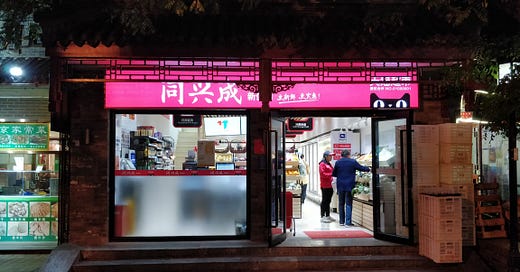The collapse of Alibaba’s New Retail? - Part 2: Hypermarkets, Supermarkets and Convenience Stores
Has New Retail ultimately failed?
Tmall Convenience Store, Beijing 2018.
Things that caught our attention
We recently wrote about Xiaomi’s move into EVs. The SU7 has been launched with prices starting from CNY215,900 (USD29,870). (source)
NPR's Planet Money did an episode on Temu that features Tech Buzz China founder Rui Ma.
If you are from The Netherlands or speak Dutch, you might be interested in the new one-week ‘Retail & Digital Revolution’ study tour that Tech Buzz China editor Ed Sander delivers in October 2024. More information here.
While Rui Ma isn’t writing any articles for Tech Buzz China at the moment, she has become much more active on Twitter (X) lately. Here are some of her recent posts:
Introduction
In the first part of this series, two weeks ago, we described how Alibaba realised it had lost significant market share to new competitors like Pinduoduo and Douyin. In our August article, Whatever Happened to New Retail?, we described how, in 2019, cracks had started to appear in Alibaba’s New Retail initiatives and how many seemed to have entirely disappeared by 2023.
In 2023, Alibaba went through several significant organisational changes, including the 1+6+N split-up (which has largely been reversed, with the IPO of Alibaba Cloud and Cainiao cancelled and Hema being postponed), the resignation of chairman Daniel Zhang and the return of Joseph Tsai and Eddy Wu as the company leaders. The two immediately set to work to implement Jack Ma’s advice to ‘return to Taobao, return to the user, return to the internet’. What the latter ‘return’ meant became apparent when, earlier this year, news broke that Alibaba was considering selling some of its New Retail investments like Sun Art, Intime and maybe even its flagship project, Hema (Freshippo). Earlier, rumours went around that the company might sell Ele.me to Bytedance.
Clearly, Alibaba has put the New Retail course into reverse.
Two weeks ago, we looked into Alibaba’s investments in shopping malls, department stores and home furnishing chains. All seem to point to projects that have helped these businesses improve their online integration and internet (guided) sales. But most of these businesses do not seem to benefit enough from the New Retail integration of online- and offline that was supposed to save traditional stores. The majority keep showing disappointing growth or even a stark decline.
In the second article of this series, we look at another prominent part of Alibaba’s New Retail strategy: its enormous investments in hypermarkets and supermarket chains. How have they fared in the past eight years?
And then there’s Alibaba’s self-operated supermarket start-up, Hema (Freshippo). At the moment, the developments around Hema follow each other rapidly without a clear conclusion. There is also much information to share on its successes and failures. We have, therefore, decided to do a third article specifically on Hema (Freshippo), which will appear in May.
The article below is only available for paid subscribers.
Freya Zhang and Ed Sander, Research Editors
Rui Ma, Consulting Editor
(click on the images above for information on the Tech Buzz China team)





